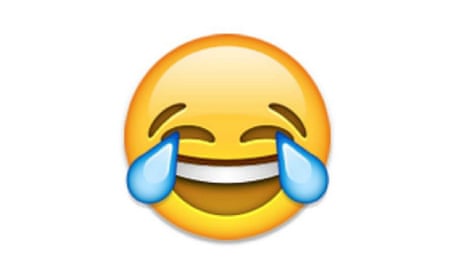We need to discuss the political significance of emoji. Not just any emoji, but the worst emoji of all. That obnoxious, chortling little yellow dickhead – bulbous, cartoonish tears streaming down its face – which seems to have taken over social media in recent months.
Some have suggested that the frog face is the worst emoji, because of its recent association with the so-called alt-right (neo-Nazi nerds, in layman’s terms) who adopted it as a mascot after the Southern Poverty Law Center declared the Pepe the frog meme a symbol of hate. These people are wrong. While it’s true that this new fascist connection has irreparably tainted the previously innocent amphibian character, it’s still not as intrinsically offensive as the “crying laughing” or “tears of joy” face that is the subject of my ire.
Emoji is a complex and ambiguous language. If your mum texts you the aubergine, for instance, it might mean that she wants you to pick up the ingredients for a moussaka. This is less likely to be the case if you receive a similar message from a lover or spouse.
Still, there’s something about this particular character – with its broad, cackling grin and the perfomatively prominent tears of mirth – that just feels inherently mocking and cruel. When I found out that the design had been used to create balaclavas, my immediate thought was: “At least we know what They’ll be wearing when They come.” Even in cases where the emoji user’s meaning seems entirely innocent, it still provokes a visceral reaction in me that I’d struggle to overstate.
It almost certainly has less to do with the actual nature of that graphic than the scenarios in which I most commonly encounter it. Most often, the sender is gloating about something or other. In many cases, the topic that appears to have amused them is the sort of thing you’d hope any empathetic, reasonable person would find unconscionably horrific. Deaths of refugees who were desperately attempting to cross the Mediterranean in a rickety, overfilled boat entirely unfit for such a journey. Reports of a rise in hate crime in the immediate aftermath of the Brexit vote. Particularly horrendous benefit sanction case studies. Trump’s threats to create a register of Muslims living in the US, to deport millions of primarily Latino US residents and to defund Planned Parenthood.
However, I’ve come to realise that the specific nature of the horror frequently isn’t the primary reason for the glee. It takes a certain level of callous disregard to respond to human suffering in such a manner, but the real target of derision is most often People Like Me. That is, socially liberal, middle-class do-gooders piously informing people that they should care about these various issues. In the words of Rage Against the Machine, the message being conveyed is clear: “Fuck you, I won’t do what you tell me.”

The idea of class-based condescension definitely factors in, but it’s the “liberal” bit that’s really key. People who respond to expressions of upset or anger about social injustice with the crying-laughing emoji are as likely to be affluent golf club members from Surrey as disillusioned jobseekers from my home city of Sheffield. Different people have different reasons for ending up on one side or another, but what’s basically happening right now is a culture war. And that chuckling, mocking emoji? They’re using it to remind us that they’re winning.
When I look at its yellow face, I see the detestable, carefree smirks of Nigel Farage and Boris Johnson as they merrily dance through the current chaos – hop, skip and jumping over the cracks in society they’ve helped drive deeper and wider, safe in the knowledge they’ll personally be just fine no matter what.
Not everyone who finds the situation hilarious has that same level of insulation, though. Many of those currently chortling away could find their personal circumstances significantly deteriorate as a result of decisions taken by the politicians they support.
That’s not really the point, though. Personally benefiting is far less of a priority than ensuring that the appropriate people are losing. Call it spite, or even just a desire to exert some sort of influence on the world because many of these people have felt powerless for a very long time. In the UK, in elite rhetoric if not always in policy, the liberal social and economic consensus has held for almost as long as I’ve been alive. Though we disagree heavily on the details, I empathise with the yearning to bring about some sort of change. It’s undeniable that the ability to affect things must feel thrilling, even if the specific nature of your influence mainly involves just totally fucking stuff up.
Long stretches of political inertia also lend a sense of unreality to the whole thing. “Sure, it kind of feels like we’re in control now, but is it possible that what I do can really make a difference?” I expect that for many it still feels like an enormous game. I could get into Baudrillard’s theory of hyperreality right now – further signalling my membership of the despised, philosophy-reading “liberal elite” – but even without modern technology the emotional impulse might be similar.
The internet has at least made it easier for people to connect with each other and feel part of something ... which sounds great, until you realise what it is that many of them seem to want to be a part of. What’s more, without it I would never have to see that sniggering yellow bastard ever again.

